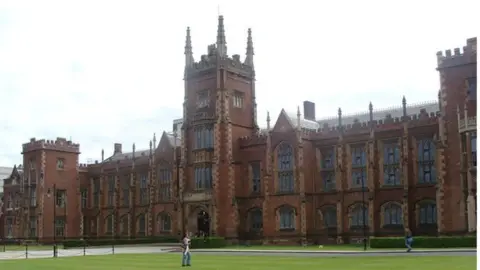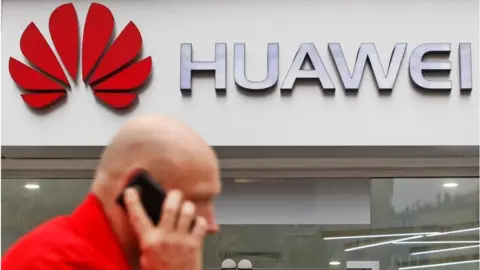Queen's cools Huawei link over spy claims
 BBC
BBCQueen's University Belfast has said it is not pursuing any new funding opportunities with Chinese telecoms giant Huawei.
The university has one existing research partnership with Huawei in wireless technologies worth more than £700,000.
The firm is facing accusations from the US and other countries that its equipment could be used for espionage.
Huawei has denied those claims, saying it does not pose a spying risk.
Earlier this month, Oxford University said it would "not pursue new funding opportunities" with Huawei.
Oxford said that decision had been taken in the light of public concerns surrounding UK partnerships with Huawei but it hoped that those matters could be resolved.
'Should be secret'
In a statement following Oxford's decision, Queen's University of Belfast (QUB) said it was continually reviewing all its relationships.
"Queen's University Belfast has one on-going project with Huawei in the area of wireless communications through the Institute of Electronics, Communications and Information Technology," it said.
"This project began in March 2017 before any uncertainty arose.
"We are continually reviewing our relationships and the university is not currently pursuing any new funding opportunities with Huawei."
 Getty Images
Getty ImagesThe existing QUB research project with Huawei received £713,111 in funding from the Engineering and Physical Sciences Research Council, the UK's main agency for research grants in engineering and the physical sciences.
The project aims to develop new technologies for use in 5G mobile communications.
Huawei has previously said it has developed research and development partnerships with many of the UK's leading universities.
However, critics have questioned how free any major Chinese business can be from Chinese government influence.
Director of the Buckingham University Centre for security and intelligence studies, Professor Anthony Glees, told BBC News NI that the UK needed to careful about how it guarded its communications.
"We live in an internet age and in a real sense the possession of vast quantities of data is a descriptor of being a great power," he said.
"The US does this interception of data far more heavily than any other nation on earth and we scarcely bat an eyelid about that.
"The issue that is raised is if we buy software and hardware from China in order to be able to run our critical national infrastructure as we would want to, are we in effect giving the Chinese government an opportunity to intercept the communications that we are running on this software and hardware?
"By working together with Huawei, universities are running the risk that they are doing something of advantage to the Chinese - as well as to ourselves admittedly with 5G - but opening that which should be secret to another state about what is communicated on those 5G pathways."
BBC News NI has contacted Huawei but has not as yet received a response.
